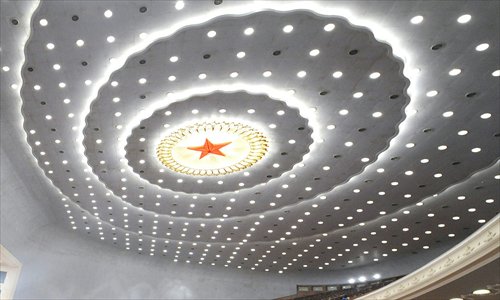Democracy within Party

In May this year, a multi-candidate election for standing membership in the provincial Party committee of South China's Guangdong Province seized public attention.
Although the election, in which 14 candidates contested 13 seats, wasn't the first competitive election at the provincial level and the candidates had strong odds of success, it was hailed by political analysts as a step toward greater intra-Party democracy.
Intra-Party democracy has been a catchphrase since the 16th National Congress of the Communist Party of China (CPC) held in 2002, during which it was characterized as the "lifeblood" of the Party.
In a report to the 17th Party Congress in 2007, the term "expanding intra-Party democracy to develop the people's democracy" was first raised, with a series of specific measures proposed to safeguard Party members' democratic rights.
While hailing the progress made over the past decade, political observers are calling for new breakthroughs to further expand intra-Party democracy by institutionalizing related rules at the ongoing 18th CPC National Congress.
Guidance needed
Zheng Yongnian, a long-time China observer and director of the East Asian Institute under the National University of Singapore, told the Global Times that progress in expanding intra-Party democracy has been remarkable at the local level, though competition in local elections still remains limited.
Compared to progress made at the local level, Zheng noted that reforms at the central government level are lagging behind, despite greater transparency being shown by the central authorities. He called for a top-down approach.
"Unlike social democracy, which was promoted from the bottom up as a result of citizens' growing awareness and the help of the Internet, the pace at which intra-Party democracy is promoted is largely decided by the will of the top Party leadership," Huang Weiping, director of the Contemporary Chinese Politics Research Institute at Shenzhen University, told the Global Times.
However, Zheng said current domestic and international situations have put pressure on the Party to change, following this year's incident involving former Chongqing Party chief Bo Xilai and various rumors from overseas.
"Given the pressure, I think the leadership will have to usher in reforms. And the sooner they carry out reforms the better," said Zheng.
During the election of members and alternate members of the 17th Central Committee of the CPC five years ago, at least 8 percent of the nominees were eliminated. The elimination margins were 3 percentage points higher than those at the 16th Party Congress.
Analysts expect that this year's competition will be fiercer, and therefore called for institutionalized rules regarding intra-Party democracy.
"It would be dangerous to compete using hidden rules, which would bring uncertainties," warned Zheng.
Liu Bingxiang, a professor on Party building with the Party School of the Central Committee of the CPC, told the Global Times that there is an urgent need to amend the rules regarding intra-Party democracy.
She noted that the single biggest problem facing intra-Party democracy is the open-ended discourse on it in the Party constitution, which stipulates that higher Party organizations may transfer or appoint responsible members of a local Party organization without elections, when the congress is not in session.
"Unless we fix this loophole, intra-Party democracy won't see substantial progress following the 18th Party Congress," said Liu.
Transparency in Party affairs
To further expand Party members' democratic rights, analysts noted that it is critical to reveal all Party affairs to the entire Party.
In a decision endorsed by the fourth plenary session of the 17th Party Congress in 2009, the Party promised to improve transparency by making public major decisions concerning the immediate interests of the people and also receiving public supervision.
Meanwhile, Party organizations at the grass-roots level were ordered to publicize their affairs by the end of 2011.
The CPC has also vowed to establish websites on Party building to promote transparency.
Zhang Xixian, a professor with the Party School, said he expected intra-Party supervision to be one of the major breakthroughs at the ongoing Party congress, adding that supervision through the Internet is a creative method being used by the Party.
To avoid turning the practice into a mere formality, Liu noted that it is critical for the central authorities to define the specific content, time frame, means and scope of publications of Party affairs.
Moving forward
In 2007, a tenure system for delegates to the Party congress was written into the amended Party constitution, granting them more rights in policy making and supervision.
Zhang said that before the adoption of the tenure system, the position of Party congress delegate was more of an "honorary title."
"After that, delegates started to carry out inspections and policy research, and participated in more meetings," he said, also noting that the Party has made progress in the selection of cadres, and now places an emphasis on democratic recommendations.
Since 2001, "public nominations and direct elections" have been carried out extensively at the community level. The system stipulates that candidates should be selected via recommendations from Party members, the public and CPC organizations, and elected directly by Party members.
Nanjing, the capital of East China's Jiangsu Province, has been a pioneer in promoting the new system. All of its community-level Party organizations studied this method of personnel reshuffles in 2010.
Liu told the Global Times that the system has introduced some democratic elements, but it is still open to manipulation, which needs to be further improved.
At the higher levels of cadre selection, a number of provinces such as Jiangsu, Qinghai and Shandong have used multi-candidate elections to select their Party standing committees.
When asked about elections, Premier Wen Jiabao said in March,"We must continue to encourage the people to take bold steps to experiment and enhance their ability in this regard. I believe that democracy in China will continue to develop step by step in keeping with China's national conditions, and no force is able to hold this process back."